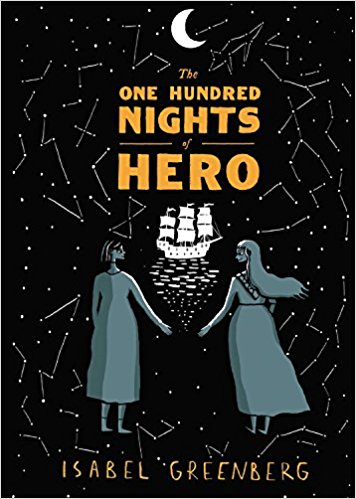Each year, Communications Director Faye Bi attempts to read the requisite 25 books to complete the Sirens Reading Challenge. In 2018, a Reunion year, she’ll be reading books from the past four years’ themes: hauntings, revolutionaries, lovers, and women who work magic. Light spoilers ahead. If you’d like some structure—or company—on your own reading goals, we invite you to read along!

We’re back, Read Along! January was cold (insert your favorite bomb cyclone pun here), it was dark (it’s finally still daylight when I leave the office, but barely), and it was bloated with the aftermath of rich holiday food and the promise of reading resolutions. I thought we would ease our way into this year’s challenge with Isabel Greenberg’s brilliant, irreverent, pure delight of a graphic novel, The One Hundred Nights of Hero. It’s perfect for long winter nights in a cozy reading chair and a big mug of tea, and it won’t take long to read—perhaps a few glorious hours if you can prevent yourself from being transfixed by every page—and it will be so worth your time to go back and savor it all over again.
The title alone might have you believe this is an homage to Scheherazade, and it is, in a way. The prologue starts almost more ambitiously: with the god BirdMan (gendered male, mansplainer extraordinaire, whom fans of Greenberg’s previous work The Encyclopedia of Earth may recognize) messing with a perfectly good thing a woman has created. In this case, it’s Earth, which was created by his daughter, Kiddo. She’s fascinated by these perfect humans she’s made, who grow up, eat, sleep, love, and eventually die. But of course, BirdMan, a foil for a certain kind of blowhard every woman knows, decides that Kiddo’s Earth is boring and that the humans should worship him instead. So he creates religion, which leads to disciples (who are . . . you guessed it, dudes) called the Beak Brothers and by the time the main story starts, Earth is a weird medieval theocracy-dystopia ruled by the patriarchy. Sigh.
It is in this world that the heart of the story begins. Two dudes, real POS dudes, decide (of course!) that they should have a bet. Manfred bets Jerome that he can seduce Jerome’s wife Cherry while Jerome is away for hundred days. Jerome is like “omg no way, my wife is way too faithful, she’s the pinnacle of purity blah blah let’s compare dick sizes” (not an actual quote) but needless to say, they make this bet and Manfred starts his quest. Little does he know that Cherry is totally in love with her maid, Hero, who is part of the League of Secret Storytellers. Hero does the Scheherazade thing where she saves Cherry from Manfred’s advances each night by weaving a tale he’s desperate to hear the end of. And Manfred, because he’s a cocky dude, just goes, “oh, well I’ll just rape Cherry the next night, no biggie” (also not an actual quote) except this happens for all the nights until Jerome comes home, because Hero lives up to her name.
There’s so much more I could say about Hero’s stories. They’re lovingly illustrated, and Greenberg draws from folklore, mythology, ballads, and fairytales. There’s the story based loosely on the Twelve Dancing Princesses, one based on the child ballad Two Sisters, and one where a man falls in love with the moon and she just goes, “Oh, well I’m the moon. What did you expect besides heartbreak?” (still not an actual quote). Stories of women who lived their lives defiantly, despite jealousy, rage, forbidden love, and accusations of witchcraft; stories of super brilliant, crafty women who find ways to resist and fight back against the oppression they’re expected to endure; stories of “brave women who don’t take shit from anyone” (actual quote). Stories of women who paid for it.
There’s a kind of dark humor and light sadness Greenberg’s gorgeous book portrays in the fantastical, whimsical illustrations. Her the dark line art and limited palette aren’t unlike those of Emily Carroll or Kate Beaton, but I find Hero and Cherry’s clapbacks harder and funnier. And yet for me, there’s so much truth to these stories not-so-buried under the rapid-fire witticisms each page offers, like these gems (all actual quotes): “Lesson: Men are false. And they can get away with it. Also, don’t murder your sister, even by accident. Sisters are important.” And “Whatever we say will make no difference. Our fates are set. They always were.” And my favorite, “No, I’m not finished yet. I’ve had quite enough of staying quiet thank you very much (sic).”
I won’t say too much about the ending, but Hero and Cherry live in a dystopia, and things don’t always turn out the best for women who dare to dream beyond the confines of their societal roles. Still, their actions and legacy spark something greater-a storytelling revolution among the women of this weird beaky world.
It’s hard to imagine another book that speaks as strongly to Sirens’s themes as The One Hundred Nights of Hero. Present in it are lovers, revolutionaries, many tales retold, various women who work magic, and probably more if I think about it hard enough. Save it for a particularly tiresome day when you’ve had enough of, oh, everything, and you need to rail against another ridiculous, unconscionable patriarchal standard. Or read it again, using Hero and Cherry’s strength as a balm when you need to feel inspired and a little less helpless about the world. You won’t regret it.
Next month’s book: Sing, Unburied, Sing by Jesmyn Ward
Faye Bi is a book-publishing professional based in New York City, and leads the Sirens communications team. She’s yet to read an immigrant story she hasn’t cried over, and is happiest planning nerdy parties, capping off a long run with brunch, and cycling along the East River.







Connect with the Sirens community
Sign up for the Sirens newsletter